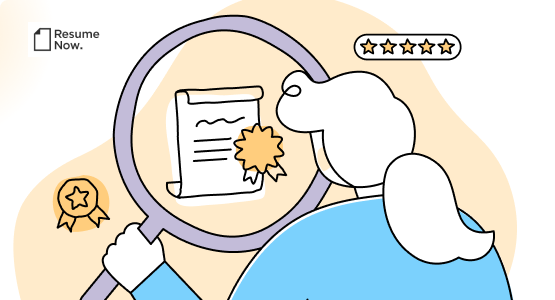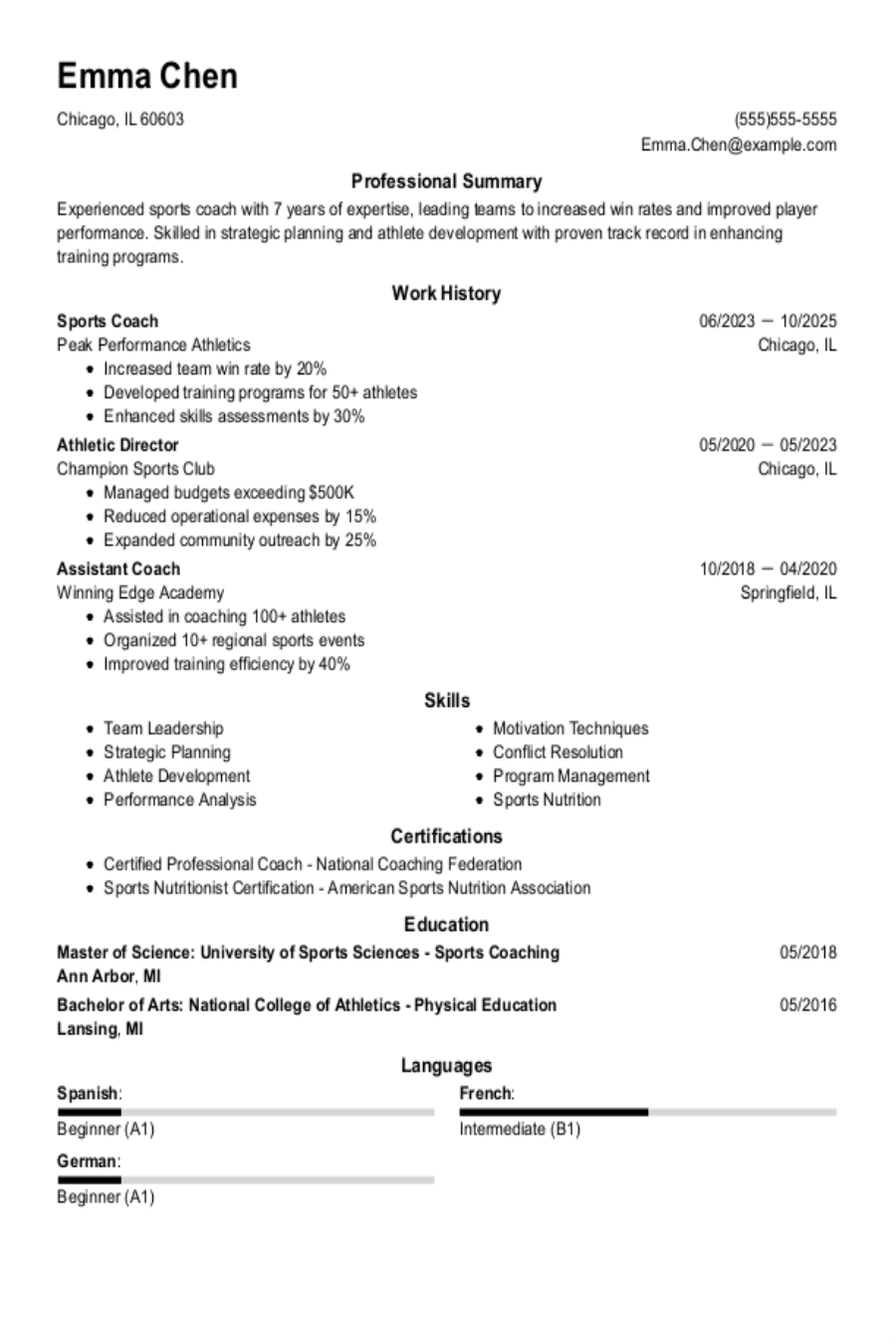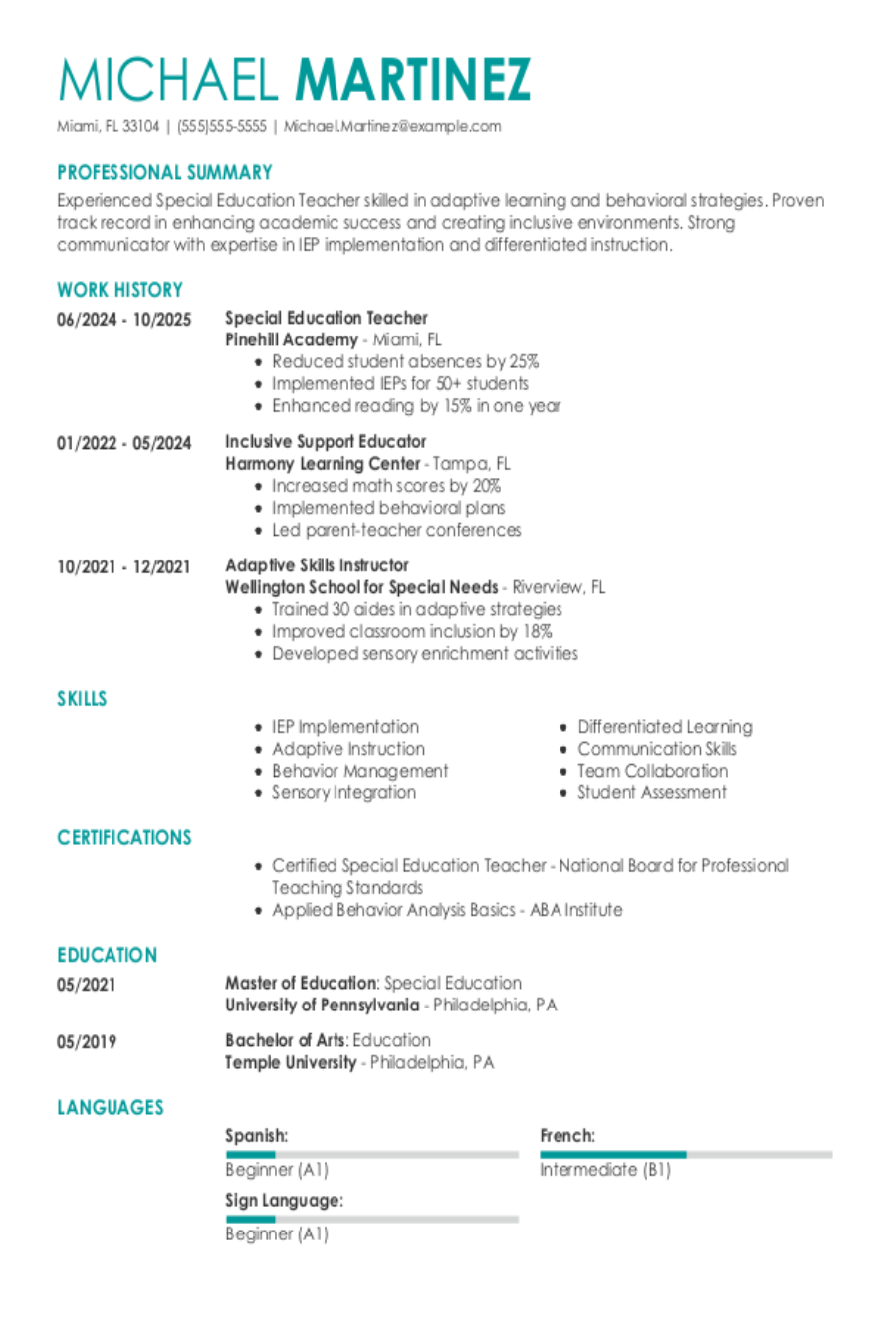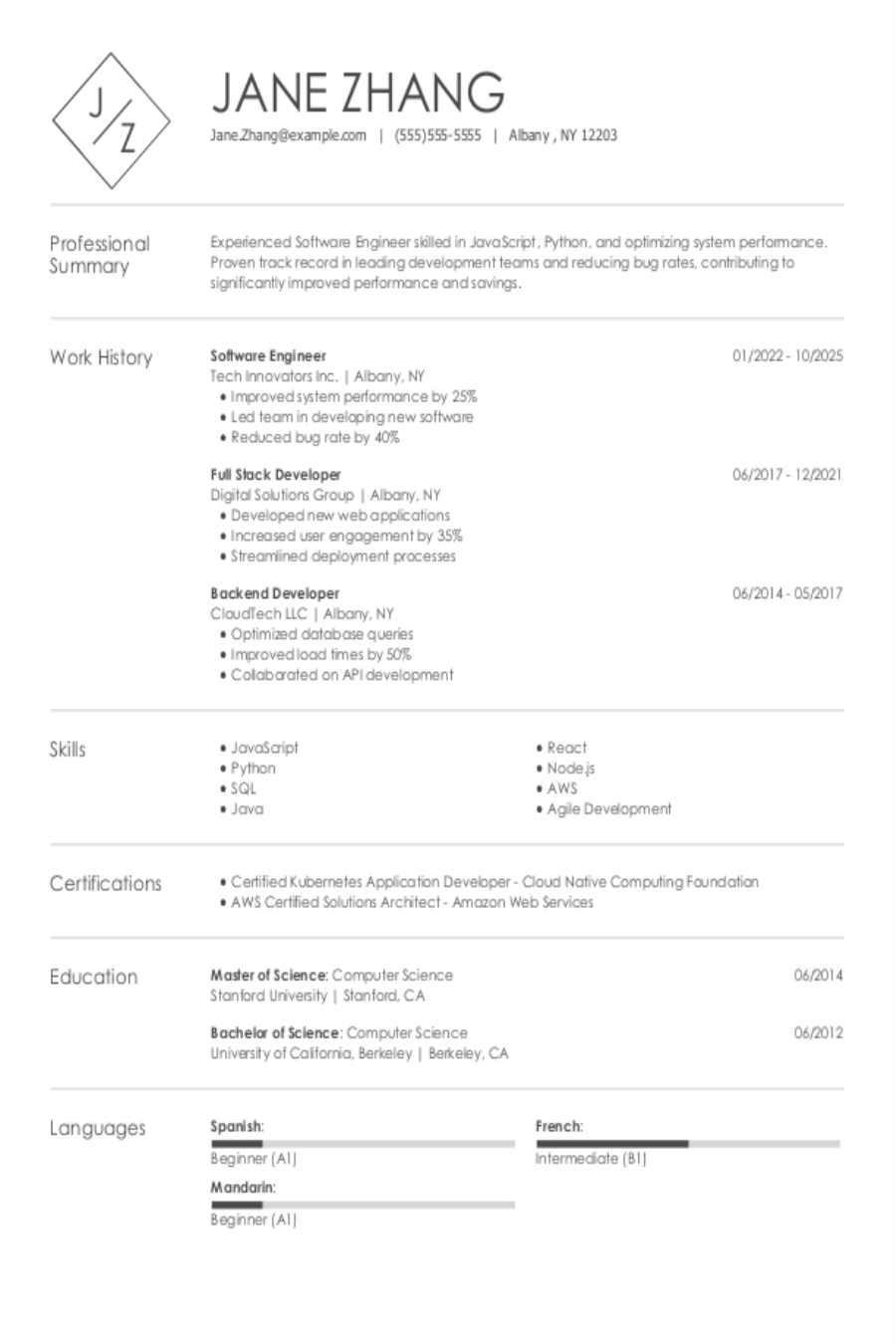Popular Restaurant Manager Resume Examples
Entry-level restaurant manager resume
An entry-level resume for a restaurant manager should focus on leadership skills, customer service experience, relevant coursework, and any certifications to demonstrate readiness for management responsibilities.
Prioritizes readability: Opting for a simple resume template ensures your qualifications stand out clearly. This clarity allows recruiters to quickly assess your skills and achievements without getting lost in unnecessary details.
Places skills over experience: The functional resume format is strategic for this restaurant manager because it emphasizes key skills like sales growth and guest satisfaction improvements instead of prioritizing limited chronological experience.
Mid-career restaurant manager resume
A mid-career restaurant manager resume should emphasize a combination of leadership experience, operational skills, and growth achievements to effectively attract potential employers in the competitive hospitality industry.
Begins with a powerful summary: This resume's professional summary highlights essential qualifications, showcasing a restaurant manager's ability to drive sales, improve customer satisfaction, and manage operations efficiently.
Employs active language: Action verbs like "increased," "reduced," and "improved" highlight significant achievements and proactive management in the restaurant industry, showcasing leadership and measurable outcomes.
Experienced restaurant manager resume
An experienced restaurant manager resume should prioritize highlighting successful operational management, team leadership skills, and measurable achievements that demonstrate career growth in the hospitality industry.
Embraces modern design: This modern resume template effectively showcases the applicant's innovative leadership style and commitment to operational excellence, improving their professional brand as a results-driven restaurant manager.
Highlights experience: The resume's opening summary effectively showcases a dynamic restaurant manager with a decade of experience. It establishes a professional tone by highlighting significant achievements in operations, sales improvement, and staff leadership.
No experience restaurant manager resume
A resume for an applicant with no experience aiming to become a restaurant manager should highlight transferable skills, relevant coursework, and any leadership roles in volunteer work or extracurricular activities to showcase readiness for the position.
Uses a simple style: The resume’s clean layout effectively highlights qualifications, showcasing achievements in event planning and volunteer coordination without unnecessary distractions.
Overcomes lacking experience: Including volunteer work and extracurricular activities improves this resume by showcasing leadership, organizational skills, and community engagement that might not be evident in professional experience alone.
More resume examples
Restaurant Manager Resume Template
Looking to create a standout application? Use this restaurant manager resume template as your base—simply adapt it with your own details for a polished presentation.
Michael Rodriguez
Dallas, TX 75204
(555)555-5555
Michael.Rodriguez@example.com
Professional Summary
Accomplished Restaurant Manager skilled in team leadership and revenue growth. Proven ability to enhance customer satisfaction and optimize operations, driving a 15% increase in revenue. Expertise in cost management and staff development.
Skills
- Team Leadership
- Revenue Growth
- Cost Management
- Customer Satisfaction
- Staff Training
- Vendor Relations
- Event Coordination
- Inventory Optimization
Certifications
- Certified Restaurant Manager - National Restaurant Association
- Advanced Food Safety Certification - ServSafe
Education
Master of Business Administration Hospitality Management
University of California, Berkeley Berkeley, CA
May 2018
Bachelor of Science Culinary Arts
California State University, Fresno Fresno, CA
May 2016
Work History
Restaurant Manager
The Golden Plate - Dallas, TX
October 2023 - October 2025
- Increased revenue by 15% through menu redesign
- Trained team, improving service rating by 20%
- Reduced supply costs by 10% via vendor negotiation
Assistant Dining Manager
Harborview Bistro - Austin, TX
January 2021 - September 2023
- Managed events increase bookings by 30%
- Supervised staff, reduced turnover by 25%
- Optimized inventory, cutting waste by 15%
Restaurant Supervisor
Sunset Grill - Pinehill, TX
October 2019 - December 2020
- Implemented new POS system, boosting efficiency
- Increased customer satisfaction rate by 12%
- Coordinated kitchen operations, reducing delays
Languages
- Spanish - Beginner (A1)
- French - Beginner (A1)
- Italian - Beginner (A1)
Must-Have Skills on a Restaurant Manager Resume
A strong skills section is essential for showcasing your qualifications effectively on a resume.
Professionals in hospitality, dining, and personal services help create experiences that leave positive lasting impressions. The skills you highlight should reflect your ability to provide attentive support in fast-paced environments. Your resume is a chance to show how you contribute to satisfaction and overall service excellence.
The following data highlights the most prevalent hard and soft skills relevant to restaurant management, based on Resume Now’s internal resume analysis.
When you’re ready to improve your resume, try our AI Resume Skills Generator. It provides tailored suggestions for both hard and soft skills according to your job title, ensuring you present a comprehensive skill profile.
Writing Your Restaurant Manager Resume
After exploring these effective resume examples, you are well-prepared to dive into the process of how to write a resume. We will guide you through each section methodically, ensuring you understand what to include for maximum impact.
List your most relevant skills
The skills section of your restaurant manager resume is important for highlighting both your technical abilities, like inventory management and staff training, as well as essential soft skills such as leadership and customer service.
Using keywords from the job listing improves readability for human recruiters but also optimizes your resume for applicant tracking systems. This strategy ensures that your application stands out in both manual reviews and digital screenings.
Example of skills on a restaurant manager resume
- Proficient in managing daily restaurant operations and staff
- Strong communicator with exceptional customer service skills
- Adept at inventory management and cost control
- Motivated leader with a focus on team development and training
The skills section of your resume should effectively communicate your readiness for the restaurant manager position. Include both technical skills relevant to the role, such as inventory management and staff training, alongside essential soft skills like leadership and communication. This combination will demonstrate your comprehensive qualifications to potential employers.
Highlight your work history
Your work experience section allows you to highlight achievements and showcase how your skills have driven successful outcomes in past roles. Use strong examples that demonstrate your ability to lead teams, improve customer satisfaction, or streamline operations effectively.
When detailing each job entry, include essential information like your title, the name of the employer or restaurant, and the dates of employment. Providing these details builds credibility and helps employers better understand your professional journey and stability within the industry.
Example of a restaurant manager work experience entry
- Restaurant Manager
Gourmet Bistro - San Francisco, CA
June 2019 - Present - Oversee daily operations of a high-volume restaurant, ensuring exceptional service standards and achieving a customer satisfaction score of 97%
- Manage a team of 20 staff members through effective training and performance evaluations, reducing employee turnover by 15%
- Implement cost-control measures that decreased food waste by 25%, contributing to an overall increase in profit margins
- Develop and execute marketing strategies that increased monthly revenue by 20% through promotions and community engagement events
- Coordinate with kitchen staff to create seasonal menus based on customer preferences and local sourcing, improving the dining experience
Quantifying achievements as a restaurant manager is essential to highlight your impact on business operations. For example, reporting a 20% increase in monthly sales after implementing a new marketing strategy demonstrates your effectiveness in driving revenue and attracting customers.
Include your education
The education section of your restaurant manager resume should display your academic credentials in reverse-chronological order, starting with the most recent degree. Include relevant degrees, diplomas, and any certifications related to restaurant management while omitting your high school diploma if you hold a higher qualification.
If you are currently pursuing a degree or have incomplete education, list the highest level you have completed along with an anticipated graduation date. You may also include bullet points that outline relevant coursework or notable achievements connected to the culinary arts or management. This is especially useful for recent graduates who want to showcase their educational background.
Common certifications for a restaurant manager resume
- Certified Restaurant Manager (CRM) – National Restaurant Association (NRA)
- ServSafe Food Protection Manager Certification – National Restaurant Association (NRA)
- Culinary Management Certificate – American Culinary Federation (ACF)
- Certified Hospitality Supervisor (CHS) – American Hotel and Lodging Educational Institute (AHLEI)
Sum up your resume with an introduction
Your resume profile serves as your first opportunity to make a lasting impression on potential employers. This section should succinctly summarize your qualifications and professional journey, allowing hiring managers to quickly gauge your suitability for the restaurant manager position.
For seasoned professionals in restaurant management, a professional summary is particularly effective. It allows you to spotlight key accomplishments and relevant experience right at the top, ensuring that recruiters can easily identify your strengths. If you're early in your career, consider adding a resume objective that showcases your drive for growth.
Professional summary example
Dynamic restaurant manager with over 10 years of experience in the hospitality industry. Successfully led teams to improve customer service standards and boost operational efficiency, resulting in increased profitability. Expertise in staff training, inventory control, and menu development ensures a seamless dining experience for guests.
Resume objective example
Enthusiastic restaurant manager eager to use strong leadership, customer service, and problem-solving skills to improve team performance and elevate guest experiences. Committed to fostering a positive work environment while driving operational excellence in a fast-paced dining setting.
As a restaurant manager job seeker, your resume profile should be concise and packed with key information. Aim to keep it within three sentences, highlighting only the most critical details. Save any additional insights for your cover letter to maintain focus and clarity in your application.
Add unique sections to set you apart
Including optional resume sections is a fantastic way to highlight your unique qualifications as a restaurant manager. These sections allow you to stand out by showcasing experiences and skills that aren't covered in traditional formats.
By adding details about relevant hobbies or volunteer work, you give potential employers insight into your values and personality. This additional information can illustrate your commitment to the hospitality industry and how you engage with your community. Sharing these aspects not only enriches your profile but also demonstrates a well-rounded character that aligns with the dynamic nature of restaurant management.
Three sections perfect for a restaurant manager resume
- Languages: As a restaurant manager, effective communication is important for team leadership and customer service. Highlighting your language skills on your resume can improve guest experiences and foster a welcoming atmosphere in diverse settings.
- Volunteer Work: Including volunteer work on a resume not only showcases your dedication to community service but also highlights valuable skills gained through real-world experiences, making you a more attractive applicant to potential employers.
- Accomplishments: As a restaurant manager, quantifiable accomplishments are vital for demonstrating operational success and financial growth. Present these achievements within your work experience section or consider adding a distinct accomplishments section to emphasize them.
5 Resume Formatting Tips
- Choose a format that matches your career stage.
Choosing the right resume format depends on your experience level. If you have significant experience, a chronological format effectively showcases your career progression. For those just starting out, a functional format highlights skills over work history. Consider a combination format for an approach that emphasizes both skills and experience in a well-rounded manner.
- Pick a smart resume template.
Using a professional resume template improves your document's readability and ensures a polished presentation. Templates streamline formatting, allowing you to focus on showcasing your skills and experiences effectively. When choosing a custom format, make sure to keep it clean and select fonts that are easy for potential employers to read.
- Select an appropriate font.
Choose a professional font to improve your resume's readability. Fonts like Helvetica, Georgia, or Verdana are clear and appealing to both automated systems and hiring managers.
- Use consistent formatting.
Ensure your resume is formatted with uniform margins and left-aligned text to create a polished and professional look that stands out to employers.
- Keep your resume to one or two pages.
When crafting your resume, remember that resumes should be one page long. If you have extensive experience, it's acceptable to extend it to two pages. Focus on making your content concise and highlighting the most relevant details to catch the employer's attention.
Tools for Your Job Search
Are you gearing up to secure that restaurant manager position you've been eyeing? Before you hit 'submit' on your application, consider using our ATS Resume Checker. This invaluable tool offers insights into how well your resume performs with the automated systems many restaurants use for initial job seeker screening.
Need a boost in presenting your culinary leadership skills? Our AI Resume Builder provides tailored content recommendations specifically designed for restaurant management roles, along with professionally crafted templates that showcase your unique qualifications and experiences to hiring managers effectively.
Frequently Asked Questions
Last Updated: November 6, 2025
Absolutely. A cover letter is important as it provides essential context to your resume and allows you to engage directly with potential employers. It’s your opportunity to express your enthusiasm for the restaurant manager role and highlight how your unique experience makes you an ideal job seeker. So go ahead, use these tips on how to write a cover letter that showcases who you are.
For a quick and effective solution, try our AI Cover Letter Generator! In just minutes, you can create a tailored cover letter that perfectly complements your resume, with options for various cover letter template designs that align seamlessly with your professional narrative.
A resume is typically a concise document, spanning one to two pages, that highlights your work experience and skills relevant to the job you’re applying for. In contrast, a CV (curriculum vitae) can extend several pages and provides comprehensive details about your academic background, research contributions, publications, and professional experiences.
You will often need a CV for roles in academia or specialized fields like law or medicine. If you find yourself needing to create a CV, our online CV Maker is here to help. With various CV templates tailored to different industries and career levels, you can quickly craft a professional-looking document that stands out in your job search.
To write a strong CV, focus on structuring your information with clear headings such as education, work experience, and skills. Choose professional templates that are both visually appealing and compatible with ATS systems. Customize your content to reflect the job description by using relevant keywords that align with the skills and experiences sought by employers.
For additional guidance, review CV examples from professionals in your field. Analyzing how successful applicants showcase their qualifications can provide valuable insights and inspire you to create a compelling narrative that highlights your strengths effectively.
A frequent mistake restaurant managers make is using a generic resume that fails to pass through ATS filters. To improve your chances, use a resume template that's ATS-friendly and tailor your resume to align with the specific requirements of the job you’re applying for. This ensures your qualifications are highlighted effectively.
To make an effective skills section as a restaurant manager, integrate both technical abilities, such as inventory management and POS system skill, with soft skills like leadership and customer service. In your experience section, illustrate how these skills drove operational efficiency and improved guest satisfaction to demonstrate their real-world impact.
To showcase your dedication to growth as a restaurant manager, list the certifications you've earned and courses you've completed. Highlight seminars you've attended and books or articles you've read. Mention any industry podcasts you follow and associations you're a part of. This not only proves your commitment but also shows you're actively engaged in staying ahead in the culinary field.
Was this information helpful? Let us know!
Keith is a Certified Professional Resume Writer (CPRW) and trusted media source in the career industry with over a decade of experience helping job seekers stand out.
More resources

How to List Language Skill Levels on Your Resume
Language skills give you an instant advantage in the job marke...

These Certifications Align With the 11 Most In-Demand Skills of 2030 and Can Boost Pay
Resume Now report reveals the high-value skills and certificat...

How to Write a One Page Resume: Guide & Examples for 2025
Was this information helpful? Let us know ...

Sports Coach Resume: Examples, Templates & Tips for 2025
Whether you re a seasoned professional or just starting your...

Special Education Teacher Resume: Examples, Templates & Tips for 2025
Want to write a special ed teacher resume that lands you a rol...

Software Engineer Resume: Examples, Templates and Tips for 2025
Want to get interviews in 2024? Our software engineer resume g...

